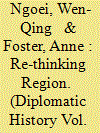|
|
|
Sort Order |
|
|
|
Items / Page
|
|
|
|
|
|
|
| Srl | Item |
| 1 |
ID:
180333


|
|
|
|
|
| Summary/Abstract |
On April 3, 2020, Singapore Prime Minister Lee Hsien Loong announced in a televised speech that his government’s “decisive move” against the country’s “escalating” Covid-19 infections would be “like a circuit breaker.” He explained that for the next month the government would close all workplaces except those of key economic sectors and essential services; have all schools and universities shift to home-based, online learning; and impose tighter restrictions on individuals’ freedom to interact with those outside of their household.
|
|
|
|
|
|
|
|
|
|
|
|
|
|
|
|
| 2 |
ID:
179072


|
|
|
|
|
| Summary/Abstract |
More than twenty years ago, historian Robert McMahon pointed out that studies of U.S.-Southeast Asian relations with a “broad, regional focus” remain “surprisingly rare.”1 His observation came in the bibliographic essay accompanying his own contribution to this sparse field, and his book remains one of precious few examples. As Kenton Clymer demonstrates in the opening essay in this Roundtable, it remains the case that few scholars study U.S. relations with countries in Southeast Asia other than Vietnam and the Philippines. The U.S. war in Vietnam, and the immediate and lingering effects of U.S. imperialism in the Philippines rightly attract significant attention. Scholars have produced compelling and sophisticated works about these topics, and continue to do so. However, contributors to this Roundtable demonstrate that the region as a whole, as well as individual countries and topics within it, deserve more study.
|
|
|
|
|
|
|
|
|
|
|
|
|
|
|
|
| 3 |
ID:
167231


|
|
|
|
|
| Summary/Abstract |
This essay examines how the history of the Cold War in Southeast Asia has shaped, and will likely continue to shape, the current Sino-US rivalry in the region. Expert commentary today typically focuses on the agendas and actions of the two big powers, the United States and China, which actually risks missing the bigger picture. During the Cold War, leaders of ASEAN (Association of Southeast Asian Nations) played a critical role in containing Chinese influence, shaping the terms of Sino-US competition and rapprochement, and deepening the US presence in Southeast Asia. The legacy of ASEAN’s foreign relations during and since the Cold War imposes constraints on Chinese regional ambitions today, which militates against the popular notion that Chinese hegemony in East and Southeast Asia is inevitable. This essay underscores that current analyses of the brewing crisis in and around the South China Sea must routinely look beyond the two superpowers to the under-appreciated agency of small- and middle-sized ASEAN actors who, in reality, are the ones who hold the fate of the region in their hands.
|
|
|
|
|
|
|
|
|
|
|
|
|
|
|
|
| 4 |
ID:
179074


|
|
|
|
|
| Summary/Abstract |
In October 1967, Prime Minister Lee Kuan Yew of Singapore paid his first official visit to the United States. Over the past year, Lee had become increasingly forthright in his support of U.S. intervention in Vietnam. Washington was eager to have him plead its case to the American public. To this end, U.S. officials arranged for journalists to interview Lee on the National Broadcasting Corporation’s Meet the Press program on October 22. Twelve minutes into the televised interview, Seymour Topping of the New York Times proposed to “shift” from discussing the Vietnam War to the real “questions in our minds”: China’s relationship with Southeast Asia. Topping asked Lee to “estimate” whether China, despite the turmoil of the Cultural Revolution, remained a “danger” to Southeast Asia, and to speak “as a Chinese who understands China.” Lee shot back: “I can’t speak as a Chinese because I am a Singaporean.” He stated that he was of “Chinese ethnic stock,” a distinction he began to insist was most “crucial” when Topping said that answering “as an ethnic Chinese” would suffice. Smiling wryly, Lee intoned that Beijing and the “aspirant in Taipei” would take umbrage that he presumed to speak for the Chinese. But he could not resist the opportunity to become the United States’ informal advisor on Chinese foreign affairs. Lee claimed he did indeed possess “the built-in memory—programming of the Chinese people,” and proceeded to address Topping’s question at length.
|
|
|
|
|
|
|
|
|
|
|
|
|
|
|
|
| 5 |
ID:
156347


|
|
|
|
|
| Summary/Abstract |
President Richard Nixon’s triangular diplomacy succeeded because a “wide anticommunist arc” of U.S. allies in Southeast Asia had confined the influence of both China and the USSR to the Indochinese states. Beijing and Moscow welcomed détente with Washington in order to accommodate to de facto U.S. hegemony in the region.
|
|
|
|
|
|
|
|
|
|
|
|
|
|
|
|
|
|
|
|
|